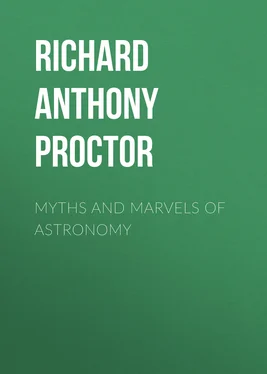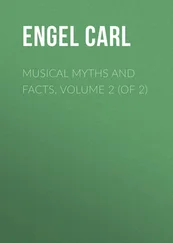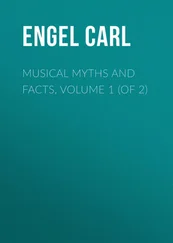Richard A. Proctor - Myths and Marvels of Astronomy
Здесь есть возможность читать онлайн «Richard A. Proctor - Myths and Marvels of Astronomy» — ознакомительный отрывок электронной книги совершенно бесплатно, а после прочтения отрывка купить полную версию. В некоторых случаях можно слушать аудио, скачать через торрент в формате fb2 и присутствует краткое содержание. Жанр: foreign_edu, Физика, на английском языке. Описание произведения, (предисловие) а так же отзывы посетителей доступны на портале библиотеки ЛибКат.
- Название:Myths and Marvels of Astronomy
- Автор:
- Жанр:
- Год:неизвестен
- ISBN:нет данных
- Рейтинг книги:5 / 5. Голосов: 1
-
Избранное:Добавить в избранное
- Отзывы:
-
Ваша оценка:
- 100
- 1
- 2
- 3
- 4
- 5
Myths and Marvels of Astronomy: краткое содержание, описание и аннотация
Предлагаем к чтению аннотацию, описание, краткое содержание или предисловие (зависит от того, что написал сам автор книги «Myths and Marvels of Astronomy»). Если вы не нашли необходимую информацию о книге — напишите в комментариях, мы постараемся отыскать её.
Myths and Marvels of Astronomy — читать онлайн ознакомительный отрывок
Ниже представлен текст книги, разбитый по страницам. Система сохранения места последней прочитанной страницы, позволяет с удобством читать онлайн бесплатно книгу «Myths and Marvels of Astronomy», без необходимости каждый раз заново искать на чём Вы остановились. Поставьте закладку, и сможете в любой момент перейти на страницу, на которой закончили чтение.
Интервал:
Закладка:
Richard A. Proctor
Myths and Marvels of Astronomy
PREFACE
The chief charm of Astronomy, with many, does not reside in the wonders revealed to us by the science, but in the lore and legends connected with its history, the strange fancies with which in old times it has been associated, the half-forgotten myths to which it has given birth. In our own times also, Astronomy has had its myths and fancies, its wild inventions, and startling paradoxes. My object in the present series of papers has been to collect together the most interesting of these old and new Astronomical myths, associating with them, in due proportion, some of the chief marvels which recent Astronomy has revealed to us. To the former class belong the subjects of the first four and the last five essays of the present series, while the remaining essays belong to the latter category.
Throughout I have endeavoured to avoid technical expressions on the one hand, and ambiguous phraseology (sometimes resulting from the attempt to avoid technicality) on the other. I have, in fact, sought to present my subjects as I should wish to have matters outside the range of my special branch of study presented for my own reading.
RICHARD A. PROCTOR.I.
ASTROLOGY
Signs and planets, in aspects sextile, quartile, trine, conjoined, or opposite; houses of heaven, with their cusps, hours, and minutes; Almuten, Almochoden, Anahibazon, Catahibazon; a thousand terms of equal sound and significance.
—Guy Mannering.… Come and see! trust thine own eyes.
A fearful sign stands in the house of life,
An enemy: a fiend lurks close behind
The radiance of thy planet—oh! be warned!
Astrology possesses a real interest even in these days. It is true that no importance attaches now even to the discussion of the considerations which led to the rejection of judicial astrology. None but the most ignorant, and therefore superstitious, believe at present in divination of any sort or kind whatsoever. Divination by the stars holds no higher position than palmistry, fortune-telling by cards, or the indications of the future which foolish persons find in dreams, tea-dregs, salt-spilling, and other absurdities. But there are two reasons which render the history of astrology interesting. In the first place, faith in stellar influences was once so widespread that astrological terminology came to form a part of ordinary language, insomuch that it is impossible rightly to understand many passages of ancient and mediæval literature, or rightly to apprehend the force of many allusions and expressions, unless the significance of astrological teachings to the men of those times be recognised. In the second place, it is interesting to examine how the erroneous teachings of astrology were gradually abandoned, to note the way in which various orders of mind rejected these false doctrines or struggled to retain them, and to perceive how, with a large proportion of even the most civilised races, the superstitions of judicial astrology were long retained, or are retained even to this very day. The world has still to see some superstitions destroyed which are as widely received as astrology ever was, and which will probably retain their influence over many minds long after the reasoning portion of the community have rejected them.
Even so far back as the time of Eudoxus the pretensions of astrologers were rejected, as Cicero informs us ('De Div.' ii. 42). And though the Romans were strangely superstitious in such matters, Cicero reasons with excellent judgment against the belief in astrology. Gassendi quotes the argument drawn by Cicero against astrology, from the predictions of the Chaldæans that Cæsar, Crassus, and Pompey would die 'in a full old age, in their own houses, in peace and honour,' whose deaths, nevertheless, were 'violent, immature, and tragical.' Cicero also used an argument whose full force has only been recognised in modern times. 'What contagion,' he asked, 'can reach us from the planets, whose distance is almost infinite?' It is singular that Seneca, who was well acquainted with the uniform character of the planetary motions, seems to have entertained no doubt respecting their influence. Tacitus expresses some doubts, but was on the whole inclined to believe in astrology. 'Certainly,' he says, 'the majority of mankind cannot be weaned from the opinion that at the birth of each man his future destiny is fixed; though some things may fall out differently from the predictions, by the ignorance of those who profess the art; and thus the art is unjustly blamed, confirmed as it is by noted examples in all ages.' 1 1 These reflections were suggested to Tacitus by the conduct of Thrasyllus (chief astrologer of the Emperor Tiberius), when his skill was tested by his imperial employer after a manner characteristic of that agreeable monarch. The story runs thus (I follow Whewell's version): 'Those who were brought to Tiberius on any important matter, were admitted to an interview in an apartment situated on a lofty cliff in the island of Capreæ. They reached this place by a narrow path, accompanied by a single freedman of great bodily strength; and on their return, if the emperor had conceived any doubts of their trustworthiness, a single blow buried the secret and its victim in the ocean below. After Thrasyllus had, in this retreat, stated the results of his art as they concerned the emperor, Tiberius asked him whether he had calculated how long he himself had to live. The astrologer examined the aspect of the stars, and while he did this showed hesitation, alarm, increasing terror, and at last declared that "The present hour was for him critical, perhaps fatal." Tiberius embraced him, and told him "he was right in supposing he had been in danger, but that he should escape it," and made him henceforward his confidential counsellor.' It is evident, assuming the story to be true (as seems sufficiently probable), that the emperor was no match for the charlatan in craft. It was a natural thought on the former's part to test the skill of his astrologer by laying for him a trap such as the story indicates—a thought so natural, indeed, that it probably occurred to Thrasyllus himself long before Tiberius put the plan into practice. Even if Thrasyllus had not been already on the watch for such a trick, he would have been but a poor trickster himself if he had not detected it the moment it was attempted, or failed to see the sole safe course which was left open to him. Probably, with a man of the temper of Tiberius, such a counter-trick as Galeotti's in Quentin Durward would have been unsafe.
Probably, the doubt suggested by the different fortunes and characters of men born at the same time must have occurred to many before Cicero dwelt upon it. Pliny, who followed Cicero in this, does not employ the argument quite correctly, for he says that, 'in every hour, in every part of the world, are born lords and slaves, kings and beggars.' But of course, according to astrological principles, it would be necessary that two persons, whose fortunes were to be alike, should be born, not only in the same hour, but in the same place. The fortunes and character of Jacob and Esau, however, should manifestly have been similar, which was certainly not the case, if their history has been correctly handed down to us. An astrologer of the time of Julius Cæsar, named Publius Nigidius Figulus, used a singular argument against such reasoning. When an opponent urged the different fortunes of men born nearly at the same instant, Nigidius asked him to make two contiguous marks on a potter's wheel which was revolving rapidly. When the wheel was stopped, the two marks were found to be far apart. Nigidius is said to have received the name of Figulus (the potter), in remembrance of the story; but more probably he was a potter by trade, and an astrologer only during those leisure hours which he could devote to charlatanry. St. Augustine, who relates the story (which I borrow from Whewell's 'History of the Inductive Sciences'), says, justly, that the argument of Nigidius was as fragile as the ware made on the potter's wheel.
Читать дальшеИнтервал:
Закладка:
Похожие книги на «Myths and Marvels of Astronomy»
Представляем Вашему вниманию похожие книги на «Myths and Marvels of Astronomy» списком для выбора. Мы отобрали схожую по названию и смыслу литературу в надежде предоставить читателям больше вариантов отыскать новые, интересные, ещё непрочитанные произведения.
Обсуждение, отзывы о книге «Myths and Marvels of Astronomy» и просто собственные мнения читателей. Оставьте ваши комментарии, напишите, что Вы думаете о произведении, его смысле или главных героях. Укажите что конкретно понравилось, а что нет, и почему Вы так считаете.












